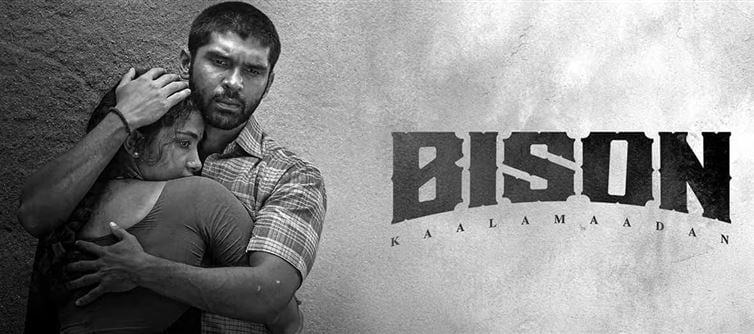
Story
Bison Kaalamaadan opens in Japan, where dhruv Vikram’s character earns his place in the Kabaddi Asia Cup finals—a stage that serves as both a triumph and a reflection of his long, turbulent journey. The narrative moves fluidly between the present and the past, revealing the struggles of an underdog who rises from humble beginnings to the international arena.
At its heart, this is not just a sports film—it’s a story of redemption, social identity, and resilience. Dhruv’s character battles both personal trauma and societal prejudice, using Kabaddi not merely as a sport, but as a metaphor for survival. Mari Selvaraj weaves in his signature sociopolitical undertones, grounding the film in the realities of caste and class without turning it into a sermon.
Performances
dhruv vikram delivers a career-defining performance. His screen presence, body language, and emotional restraint showcase maturity far beyond his years. The echoes of his father, Chiyaan Vikram, are unmistakable, yet Dhruv’s performance is distinct—rooted in authenticity rather than imitation. His transformation into a determined Kabaddi player is both physical and emotional, and the high-octane bus fight sequence is a testament to his dedication.
Pasupathi is magnificent as the warm yet firm father. His character arc, deeply emotional and sensitively written, forms the emotional core of the story. Every glance and dialogue from him adds a layer of depth to the father-son dynamic. Lal’s performance brings gravitas and tenderness to the narrative, his chemistry with dhruv standing out in key scenes.
Anupama Parameswaran surprises with a grounded, fresh portrayal that departs from her usual roles, while Ameer, despite limited screen time, leaves a notable impact. Aruvi Madhan, as the P.E. teacher, adds energy and charm, excelling in scenes that bridge the emotional and athletic beats of the film.
Technicalities
Technically, Bison Kaalamaadan is top-tier. Nivas K. Prasanna’s music and background score elevate the emotional weight of every scene—especially during the Kabaddi matches and father-son sequences. His soundscape captures both grit and grace, enhancing the film’s texture.
The cinematography is visually compelling, balancing the vibrancy of the sport with the stark realities of the characters’ lives. The dynamic camera work during Kabaddi sequences makes every tackle and sprint feel immersive. Editing maintains a rhythmic flow, though a tighter cut—especially trimming 15–20 minutes in the latter half—could have improved pacing.
The stunt choreography is exceptional, capturing the sport’s physical intensity with cinematic flair. However, Mari Selvaraj’s brief experimentation with black-and-white frames—clearly inspired by Oppenheimer—feels unnecessary in an otherwise raw and naturalistic narrative.
Analysis
Mari Selvaraj once again proves that he’s among tamil cinema’s most thoughtful storytellers. Bison Kaalamaadan draws inspiration from real-life incidents and merges them with fiction to craft an emotionally powerful sports drama. The film’s strength lies not in its spectacle, but in its soul—the inner battles of a young man striving for dignity through his sport.
Selvaraj’s writing brims with authenticity. The world feels lived-in, the characters multidimensional, and the message on caste and unity subtly but powerfully conveyed. The film never feels didactic; instead, it moves you through human emotion. The screenplay occasionally loses rhythm, particularly in the second half, where scenes overstay their welcome, but the sincerity of intent keeps it engaging.
The violence, though impactful, borders on excessive at times, and a bit of moderation could have expanded the film’s reach among family audiences. Still, Bison Kaalamaadan remains a compelling narrative that blends social commentary with sports drama—visceral, emotional, and deeply rooted in tamil ethos.
What Works
• dhruv Vikram’s commanding performance and emotional authenticity• Pasupathi’s powerful portrayal of a father’s love and sacrifice
• Nivas K. Prasanna’s stirring music and impactful background score
• Visually rich cinematography and intense Kabaddi sequences
• Mari Selvaraj’s nuanced writing and subtle social messaging
• Strong emotional payoff and well-drawn character arcs
What Doesn’t
• Overextended runtime—needed tighter editing, especially in the second half• Excessive violence may alienate family audiences
• Occasional indulgence in visual experimentation (black-and-white frames)
• Slightly uneven pacing disrupts the narrative momentum
Rating ⭐ 3.75 / 5
Verdict Meter:
🔥 80% – A powerful and emotionally charged sports drama anchored by stellar performances and Mari Selvaraj’s compelling vision. Despite minor flaws, Bison Kaalamaadan stands tall as one of tamil cinema’s most engaging sports films in recent years.




 click and follow Indiaherald WhatsApp channel
click and follow Indiaherald WhatsApp channel